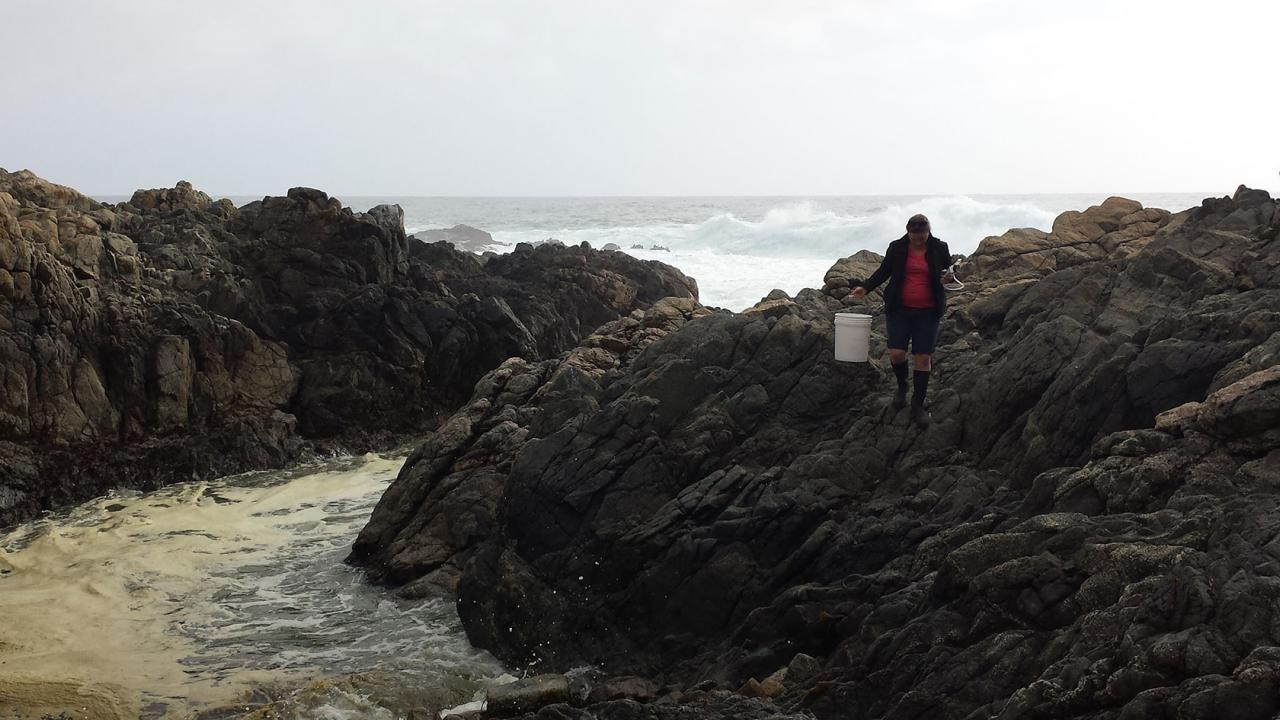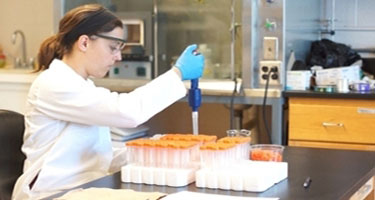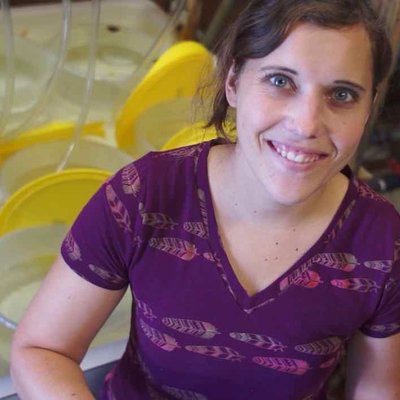
Spotlight On: Brittany Jellison
Brittany Jellison is a PhD student in Ecology in the College of Biological Sciences at Bodega Bay Marine Laboratory. Her research focuses on marine ecology, global change ecology, species interactions, ocean acidification, and animal behavior.
Tell us a little about your research?
 I am looking at the effects of climate change on species interactions. I’m particularly interested in how ocean acidification affects predator-prey interactions. Ocean acidification has been shown to affect fish behavior. Experiments on tropical fish have shown that reduced pH impairs their ability to home and detect predators. I am interested in whether or not similar impairments will occur in invertebrates, especially because invertebrates dominate the intertidal zone on our coast. Currently, I am studying a predator-prey interaction between a keystone sea star predator and a snail prey. Many prey of the ochre sea star are able to detect the predator is nearby through chemical cues. Many of these organisms have different adaptations that help them deal with this predation threat. Once they detect that there is a risk in their environment, organisms respond in ways that reduce this risk. For instance, some organisms can grow harder or thicker shells while others will flee. In the system I work in, snails are able to detect that a predator is nearby and crawl out of tide pools to find refuge. I am looking at whether ocean acidification will disrupt this behavioral response and have community-level consequences.
I am looking at the effects of climate change on species interactions. I’m particularly interested in how ocean acidification affects predator-prey interactions. Ocean acidification has been shown to affect fish behavior. Experiments on tropical fish have shown that reduced pH impairs their ability to home and detect predators. I am interested in whether or not similar impairments will occur in invertebrates, especially because invertebrates dominate the intertidal zone on our coast. Currently, I am studying a predator-prey interaction between a keystone sea star predator and a snail prey. Many prey of the ochre sea star are able to detect the predator is nearby through chemical cues. Many of these organisms have different adaptations that help them deal with this predation threat. Once they detect that there is a risk in their environment, organisms respond in ways that reduce this risk. For instance, some organisms can grow harder or thicker shells while others will flee. In the system I work in, snails are able to detect that a predator is nearby and crawl out of tide pools to find refuge. I am looking at whether ocean acidification will disrupt this behavioral response and have community-level consequences.
What is your background?
 In high school, I took a community college course in Mexico and it was an incredible experience. I got to swim with so many different organisms and learn basic marine biology while being in the field. Though, at that point, I still thought, “this is wonderful and I really love this, but I am unsure if I can make a career out of it”. So I went to UC San Diego and studied general Biology. However, after studying abroad in Costa Rica, working on deep- sea research in Lisa Levin’s lab at Scripps Institution of Oceanography and taking a year off to work for Fish and Wildlife, I decided I wanted to become a marine biologist and I chose to go to grad school.
In high school, I took a community college course in Mexico and it was an incredible experience. I got to swim with so many different organisms and learn basic marine biology while being in the field. Though, at that point, I still thought, “this is wonderful and I really love this, but I am unsure if I can make a career out of it”. So I went to UC San Diego and studied general Biology. However, after studying abroad in Costa Rica, working on deep- sea research in Lisa Levin’s lab at Scripps Institution of Oceanography and taking a year off to work for Fish and Wildlife, I decided I wanted to become a marine biologist and I chose to go to grad school.
What is the hardest part of the research process?
Once I have observations, coming up with novel questions and effective ways to test those questions can be difficult. Also, no matter what, something is going to go awry in every experiment. So thinking on your feet and coming up with solutions can be challenging but also rewarding.
What is your objective for this research? What do you hope this research will accomplish?
There is a growing awareness that humans are modifying and impacting marine ecosystems. Experiments are helping shed light on how ocean acidification will affect marine ecosystems in our lifetime and beyond. So my hope is that my research will help bring more awareness to this problem so that we can start to come up with potential short and long-term solutions.
What are your plans after this?
I really enjoy teaching, and especially enjoy mentoring students. I definitely want to include teaching and research in whatever job I have in the future.
What has been your greatest accomplishment so far? What are you most proud of?
I am really, very proud of the work I did through a program called CAMEOS in which I went to a local high school once a week to teach the students about the scientific method and about marine biology. I was just so proud and impressed with the independent projects they did, and it was such a growing experience for me as an educator. I learned a lot about myself and about effective teaching methods. It also benefitted my research because the students would ask very insightful questions about my projects.
Do you have any advice for recent graduates?
I love grad school and it is a great experience for me. To figure out if it is right for you, I would recommend either working in a lab or taking time off after college to make sure this is something you really want to do. You are going to be in that phase of life for 5 or 6 years, and it is a very big decision. It can be a wonderful time where you get to think deeply and do hands-on research, but it can also be very stressful as well. My advice would be to find something you love to do that also challenges you and pursue it.
I realized graduate school was for me because I was spending so much time in the lab and still loving it every day. Also at the end of the day, I still had so many questions that I wanted to study. This made me realize that I wanted to be a scientist.
